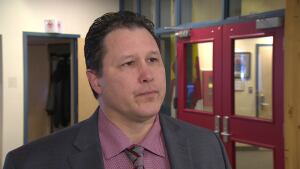Auditor general finds Nunavut’s support of health-care workers lacking
Nunavut’s health-care system suffers from major deficits in staff training and recruitment, says a report by the auditor general of Canada.
The audit, tabled in the Nunavut Legislature on Tuesday, determined that the Department of Health was failing to support staff at health centres across the territory and as a result Nunavummiut suffered.
“While the Department of Health had procedures for reviewing and improving the quality of health services, these procedures were seldom followed,” said James McKenzie, principal of the office of the auditor.
The report found that the department did not track incidents relating to patient care or staff safety and therefore could not identify trends or root causes.
James McKenzie, principal of the office of the auditor general, answers questions about the auditor general of Canada’s report on Nunavut health care. (Sara Frizzell/CBC)
Data collected from different sources revealed patients were given inappropriate medications, the wrong vaccine doses, and were overdue for care.
McKenzie noted another barrier was the paper records kept by the department, which delayed some of his office’s requests for information.
- ‘She kept asking for help’: Iqaluit woman monitored daily by nurses dies from liver failure
- Language barriers threaten patient safety at Iqaluit hospital, says report
In response, the department is developing an intranet to centrally review and distribute information related to department initiatives, but McKenzie said it’s still waiting on human resources software it requested in 2015 that could speed up the hiring process.
On average, it took a year and a half to fill a position after it became vacant. It took over a year for the department to review the file and post an ad for the position.
Some positions, including for nurses, remained vacant for many years.
In the meantime, the territory has relied heavily on temporary and agency nurses, which causes its own problems.
“The high use of temporary staff can affect the continuity and quality of care provided to patients. Using a high number of temporary staff to fill nursing vacancies can also place extra pressure on permanent community health nurses,” the report said.
Staff lack training
In addition to staff shortages, it was found that existing staff received insufficient cultural and technical orientation and training.
Most notably, X-ray technicians and interpreters felt they didn’t have enough training or that their training was years out of date.
One departmental analysis found that 45 per cent of the X-rays taken in certain health centres during the 2014-15 fiscal year were of poor quality for diagnostic purposes, which the report said “raised concerns about risks to patients, staff, and the department.”
Similarly, there was no mandatory training for clerk interpreters working in a medical environment.
While optional courses existed in some communities, the report said emphasis on the correct terminology was important for Inuit who don’t speak English, to better understand their conditions.
The department recognizes the need to improve training and received a training budget of $1.6 million in the 2016-17 fiscal year, with $950,000 earmarked for X-ray training.

Nunavut Minister of Health George Hickes says progress has already been made in several areas mentioned in the auditor general’s report. (Vincent Robinet/CBC)
Minister of Health George Hickes said that progress has already been made in several areas the auditor general’s report touches on, as some of the data is months old.
“I don’t want people to think that we’ve been sitting on our hands on this, there’s been a number of initiatives that have been identified.”
Staff safety to be addressed
The health minister said he was surprised to hear that there wasn’t a formal tracking mechanism in place to monitor nurses’ safety.
Hickes confirmed that 10 health centres are expected to hire security guards over the next year.
Of the community health centres, only Pangnirtung had a security guard, who was put in place after break-ins.
The reported noted incidents of staff receiving physical and verbal abuse, threats from patients, as well as break-ins at health centres.
Part of the review included a health department survey from 2015 that found many community health nurses outside Iqaluit worried about their safety while on call.
Next steps
The report on Nunavut health care was conducted over two years from April 1, 2014, to March 31, 2016.
The Nunavut Department of Health agreed with all 17 of the report’s recommendations, as did the Department of Finance regarding recommendations where it was implicated.
The departments are expected to respond by introducing their formal action plans to the legislature in May.
The office of the auditor general encouraged the departments to reach out to Nunavummiut for feedback before that point.
The office does not impose deadlines to enact its recommendations, but will check back periodically to determine if there is a need for a followup audit.
As this audit focused on front-line clinical care, mental health support was not evaluated.